Berks Conference Annual Book Prize Winners
First Book (Non-Women/Gender/Sexuality)

Michelle Lynn Kahn, Foreign in Two Homelands: Racism, Return Migration, and Turkish-German History (Cambridge: Cambridge University Press, 2024)
In Foreign in Two Homelands: Racism, Return Migration, and Turkish-German History, Michelle Lynn Kahn rethinks the nature of belonging and identity through her analysis of the hundreds of thousands of Turkish guestworkers in the Federal Republic of Germany (West Germany), many of whom took vacations in neighboring countries, and retraced the 3,000 km. trek back to Turkey as a process of temporary and permanent return, even as they were challenged with feeling outcast at home and abroad. Kahn extends the analysis of borders and belonging beyond individuals and to the construction of Europeanness and its margins. The book upends a common explanatory trope about the resurgence of racism and white nationalism which emerged in the 1980s and early 1990s as a product of the influx of East Germans. Kahn's work contributes a powerful and timely narrative for the current 21st century moment.
Honorable Mention
Sarah L. H. Gronningsater, The Rising Generation: Gradual Abolition, Black Legal Culture, and the Making of National Freedom (Philadelphia: University of Pennsylvania Press, 2024)
Sarah L. H. Gronningsater's The Rising Generation: Gradual Abolition, Black Legal Culture, and the Making of National Freedom offers a beautifully crafted narrative which examines the ways in which the "rising generation"—enslaved African Americans born in New York City between 1799 and 1827—shaped the processes of emancipation nationwide. Using a large body of sources, Gronningsater skillfully brings together the history of race, gender, and childhood, to expand our understanding of northern emancipation, Black agency in shaping the contours of citizenship, and the legacy of slavery in the Empire State.
The committee was impressed by the complexity and nuance of Gronningsater's analysis and the ways in which the book broke new ground in the already well-studied history of emancipation.
First Book (Women/Gender/Sexuality)

Eva Payne, Empire of Purity: The History of Americans' Global War on Prostitution (Princeton: Princeton University Press, 2024)
Empire of Purity impressed all readers with its empirical depth, analytical sophistication, and accessible prose. Payne skillfully brings together the histories of empire, colonialism, and sexuality to trace the emergence and operation of what she terms "American sexual exceptionalism" from the 19th century through the late 20th century.
The book's expansive temporal and spatial scope is masterfully executed, consistently delivering compelling historical storytelling that draws readers in. We find that the work offers a nuanced feminist analysis of sex work, illuminating how the machinery of the state dehumanized individuals through systems of surveillance and incarceration. The state's pursuit of "purity" was used to enforce moral norms both domestically and abroad.
In our final analysis, we believe Empire of Purity will significantly enrich undergraduate and graduate classroom discussions on American imperialism and the histories of prostitution and sex work.
Honorable Mention
Susanna Ferguson, Labors of Love: Gender, Capitalism, and Democracy in Modern Arab Thought (Stanford: Stanford University Press, 2024)
Susanna Ferguson's Labors of Love: Gender, Capitalism, and Democracy in Modern Arab Thought explores the politization of motherhood and childrearing as presented in the Arabic women's press. Her work begins with a brief examination of an editorial from the journal al-Mar'a al-Jadida (The New Woman). The editorial extolls the value of women's work in the home, particularly the work of childrearing. The anecdotal editorial leads the reader into a world of Arabic women's thoughts beyond their role in the home and into the wider arena of political rights. Situating her study during a period of cultural Renaissance in the Arab east between 1850 and 1939, Ferguson argues that exploring women's writings surrounding rearing children (tarbiya) unearths their profound discussions about modern life that "capitalism, nationalism, and liberalism have long attempted to obscure" (2). The strength of Ferguson's work rests in the deep analytical dive she takes in the written discourse that reveals the ways feminism and concepts of power and labor form foundational discussions about equality. The complexity of Ferguson's argument is presented in each chapter that combines childrearing with other political ideologies such as liberation and anticolonial temporality. The initial foray into the writers about motherhood sets the tone as well as the path for the work. The source material for this work is based on dozens of women-edited Arabic periodicals illustrating the potency of the press in providing scholars an avenue into the ideas and issues women centered in their world. Ferguson's Labors of Love is a skillfully analyzed work demonstrating the complicated world of home and politics for Arabic women.
First Book (Non-Women/Gender/Sexuality)

Lucia Carminati, Seeking Bread and Fortune in Port Said: Labor Migration and the Making of the Suez Canal, 1850-1906 (Oakland: University of California Press, 2023)
In Seeking Bread and Fortune in Port Said, Lucia Carminati explores migration, labor, and power in the developing city of Port Said during the construction of the Suez Canal. Port Said as a physical and fixed place is made more capacious by Carminati's nuanced assessment of the complex population of migrant laborers who converged on, and created, a city site to construct (what would become) a globally significant shipping canal. Seeking Bread deftly plays on the canal's intended function as a conduit for the mobility of goods while skillfully addressing the mobility of migratory labor. Carminati incorporates multiple aspects of the canal's building, arguing mostly that a deeper examination of the laborers who constructed the canal reveal the complexity of mobility, of identities of migrant labor in the Middle East and the Mediterranean, of the formation of a city/community by migrants, and how laborers sought agency in a struggle over power with elites. The history of the Suez Canal and the development of a port city and its government are present in this work, but labor remains at the center. Most obvious is Carminati's astute use of migrant stories as sources, in addition to conventional memoirs, travel guides, and newspapers. This work is a valuable and timely contribution to the field of the Middle East, the economic impetus behind urbanization, and importantly, global migration.
Honorable Mention
Divya Cherian, Merchants of Virtue: Hindus, Muslims, and Untouchables in Eighteenth-Century South Asia (Oakland: University of California Press, 2023)
In Merchants of Virtue, Divya Cherian has made a monumental contribution to historical knowledge of Hindu-ness and Hindu consciousness. Using 17th -18th century records from Marwar, under Rathor rule, Cherian traces how the state and an emergent merchant class used and reconfigured caste to consolidate social and political power. Marwar, a regional center, was part of global changes in oceanic trade, capital markets, and the circulation of goods during the early modern period. As an economic force, Marwar merchants tied their role as money lenders to the needs of the ruling elite and consolidated upper caste conditions and standing. The depth of research and nuance of argument are gifts that Cherian deploys to show how the fluidity of everyday custom got harnessed to rigid practices that further inscribed Hinduism in the colonial period and Hindu nationalism in anti-colonial struggle. Cherian brings clarity and authority to her work. The committee particularly commends the author for the contributions to the field and the myriad ways the book asks us to rethink how, when, why, and from what the body politic emerges as well as from which individual bodies, in what spaces, bear the biggest burdens.
It should be noted that the book available to all through the University of California Press open source program, and available at https://doi.org/10.1525/luminos.139
First Book (Women/Gender/Sexuality)
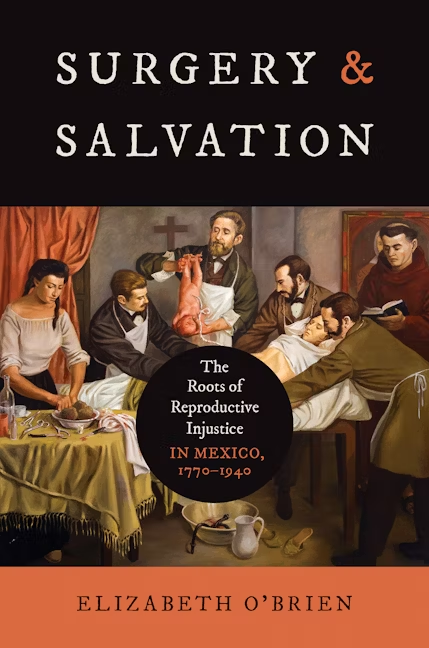
Elizabeth O'Brien, Surgery and Salvation: The Roots of Reproductive Injustice in Mexico, 1770-1940 (Chapel Hill: University of North Carolina Press, 2023)
Elizabeth O'Brien has written a brilliant book that centers Mexican women as historical actors across a long temporal sweep from 1770-1940. Based on a variety of sources, from the theses of medical students to newspaper articles, she tells the story of women who experienced surgical procedures. Rich empirical data reveals the depth of her quantitative research, which is elegantly presented with rich analysis. This history could have been the story of doctors as agents of the state given the sources, but it's not, or it could also have been about religious actors, but reading against the grain we are presented a well fleshed out history of the deep entanglements between medicine, religion, and state in dictating women's reproductive destinies in Mexico. Surgery and Salvation is crafted in the best traditions of transnational feminist history, where the author leans on interdisciplinary scholarship and comparative analysis to capture competing histories of reproduction, as it intersects with politics and histories of race, class, gender, religion, and nation. O'Brien's book is a timely intervention in the contentious debates on reproductive rights, while masterfully sidestepping potential pitfalls of anachronism. We see the book adding much to our appreciation of competing global reproductive histories, encouraging readers to imagine multiple possibilities for the future.
Honorable Mention
Amanda Ricci, Countercurrents: Women's Movements in Postwar Montreal (Montreal: McGill-Queen's University Press, 2023)
Ricci's work is an important contribution to the history of feminism(s) in Montreal from the 1960s to the 1990s. Writing against the "exclusion narrative," which centers the older white English and French-speaking communities in the city, her work provides a true comparative framework to better understand the complex history of feminist activism among often understudied minority groups in Quebec. Examining the ways in which distinct political projects shaped each community's approach to feminism, Contercurrents offers a well-developed study of the differing priorities, hopes, and struggles of the area's French-Canadian, Italian, Kanien'kehá:ka, African, and Haitian women. Using newsletters, conference proceedings, newspapers, oral histories, personal archives, and community-based archives, the book grapples with an extremely complex socio-cultural and political history. It draws from an extensive historiography, developing arguments that engage with scholars writing on French and English Canadian, American, Indigenous, immigration, transnational, colonial, and global South history. Altogether, Ricci's work has depth and nuance, and compels us to rethink well-known concepts, such as feminism, radicalism, and nationalism, and what they truly meant to the women who practiced them.
First Book (Non-Women/Gender/Sexuality)
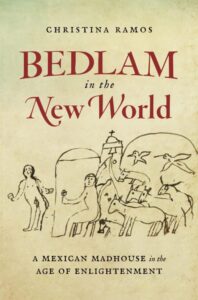
Christina Ramos, Bedlam in the New World: A Mexican Madhouse in the Age of Enlightenment (Chapel Hill: University of North Carolina Press, 2022)
Bedlam in the New World is a history of madness – of how people understood mental illness and grappled with the complexities of caring for individuals who did not conform to prescribed behavior. Focused on the Hospital of Saint Hippolytus in Mexico City (established in 1567), Christina Ramos shows that the first mental hospital in the Americas remained a remarkably flexible institution for over three hundred years.
She does so by taking a history from below approach that centers the experiences of people who stayed there. Based on exemplary archival research, the author sophisticatedly pieces together a narrative that challenges historiographical assumptions that such places were about social control and punishment, as posited for Europe. Instead, Ramos reveals that people who struggled with mental distress found a degree of respite within this hospital's walls. Nurses and doctors operated within a caregiving culture based on Christian ethics that did not weaponize scientific knowledge.
Ramos thus demonstrates that the medicalization of mental illness varied by historical context, in this case driven by a sense of social responsibility for suffering people. Her book is a novel contribution to various fields, including the history of science and medicine and urban history.
Read more: Washington U. Center for the Humanities interview with Christina Ramos >
Honorable Mention
Kathryn Olivarius, Necropolis: Disease, Power, and Capitalism in the Cotton Kingdom (Cambridge, MA: Harvard University Press, 2022)
In Necropolis: Disease, Power, and Capitalism in the Cotton Kingdom, Kathryn Olivarius examines the intersection of yellow fever epidemics, race, socioeconomic class, and political power in antebellum New Orleans. Instead of creating opportunity for social or cultural change, the disease created the basis for a hierarchy that benefited from resisting change and perpetuating inequalities. She convincingly argues that White New Orleanians claimed their supposed immunity proved their superiority which they then utilized for economic and political gain. Any immunity of those enslaved, on the other hand, provided continued support for slave-based capitalism and exploitation of new immigrants.
Her impressive use of archival materials provides a window into understanding the connections among disease, race, economics, and politics from multiple angles. Necropolis is a fascinating and highly original contribution to the field.
First Book (Women/Gender/Sexuality)
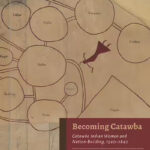
Brooke M. Bauer, Becoming Catawba: Catawba Indian Women and Nation-Building, 1540-1840 (Tuscaloosa: University of Alabama Press, 2022)
Brooke M. Bauer's Becoming Catawba: Catawba Indian Women and Nation-Building, 1540–1840 is a deeply feminist work which tells the history of women who maintained the Catawba Nation. Bauer shows how Catawba women stewarded their ancestral lands in the Carolinas, stressing their role as water keepers, and how they sustained their Nation's beliefs through cultural production and pedagogical practices.
Drawing on the methods of women's history, ethnohistory, and environmental history, Bauer decolonized the archives that often obscured the presence, let alone the role that women played in the community. Using pottery, letters, maps, oral tradition, oral history, materials culture, museum and archeological artifacts, she artfully traced the intricate role that women played in the nation building process. Thanks to her intimate and distinct knowledge of the language, her work highlights how these women safeguarded the survival of the Catawba people and their identity.
Honorable Mention
Christine Taitano DeLisle, Placental Politics: CHamoru women, White Womanhood, and Indigeneity under US Colonialism in Guam (Chapel Hill: University of North Carolina Press, 2022)
An important contribution that centers indigenous CHamoru women's experiences in analyzing power relations under US colonialism in Guam. DeLisle's work is methodologically expansive whereby she uses wide-ranging sources to craft the historical narrative drawing upon oral histories, letters, photographs, and military records. Her work highlights the complex interactions across race, class, gender, indigeneity in the making of colonial and postcolonial Guam society, beyond trauma.
This work extends the discussion on indigenous sovereignty highlighting the work CHamora women performed as stewards of land and bodies. In claiming their bodies and placentas, these women fought to simultaneously control their bodies and their lands, pushing back against the violence that was visited upon their physical bodies and their lands. The author fleshes out the connection between the two and in doing so allows for the resilience and agency of CHamoru women to be illuminated in the past and into the present. Moreover, Delisle's work centers reproduction as a lens for examining the past, allowing readers to recognize that even as this was an embattled ground, subaltern groups found creative ways to retain bodily and cultural integrity in the face of colonial violence.
Honorable Mention
Sarah Mellors Rodriguez, Reproductive Realities in Modern China: Birth Control and Abortion, 1911-2021 (Cambridge: Cambridge University Press, 2023)
This study is a careful mapping of the changing history and landscape of reproduction across modern Chinese history from 1911-2021. The author charts the shifts from pro-natal to anti-natal, back (in the more contemporaneous times) to pro-natalist state policies and politics. It is a great read in allowing us to recognize competing histories of reproductive politics across time and space. Similar to DeLisle's work Mellors-Rodriguez highlights how centrally state politics are determined through reproductive imperatives, which are tied to ever-evolving modernist ideals of progress and economic development.
First Book (Non-Women/Gender/Sexuality)
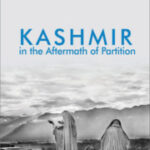
Shahla Hussain, Kashmir in the Aftermath of Partition (Cambridge: Cambridge University Press, 2021)
Hussain's work offers one of the first historical accounts of post-Partition society and politics in Kashmir, a region that has been categorized as a conflict zone ever since the creation of India and Pakistan in 1947. Because of its status as a disputed territory, Kashmir has been studied mainly by scholars of political science or international relations. It also figures prominently in global policy literature focusing on issues of national security and sovereignty.
In contrast, this monograph centers on Kashmiri people, social structures, and the ever-evolving idiom of Kashmiri politics. In particular, Hussain's book examines the meanings inherent in the resilient yet controversial slogan of azadi (freedom), demonstrating an innovative approach to nation building. By emphasizing the limitations of modern political categories such as territoriality, sovereignty, and nation state, the book offers a critique of colonial and post-colonial political maternities in South Asia.
Kashmir in the Aftermath, moreover, demonstrates archival ingenuity; the author created an "alternative archive for reconstructing the Kashmiri consciousness" based on ethnographies to center people's historical memory. Hussain's work is a well-researched and well-argued book on a global region that has witnessed extraordinary human sufferings in the past seventy-five years and yet has received negligible scholarly attention.
Honorable Mention
Alaina E. Roberts, I've Been Here All The While: Black Freedom on Native Land (Philadelphia: University of Pennsylvania Press, 2021)
Roberts' book examines the connections between slavery, freedom and settler colonialism in Indian territory from the long nineteenth century. Using family history throughout the narrative, Roberts challenges the established definitions and boundaries of key concepts that have been taken for granted in recent scholarship—settler colonialism, Reconstruction, citizenship, and freedom. Through a well-researched study, she unpacks the complexity of the exchanges and meanings of freedom, without shying away from difficult decisions on land claims, violence, "civilizing" and economic processes, claims of citizenship, and reparations. Roberts not only challenges our understanding of Reconstruction as a political process which focused on African American civil rights, she also adds to our understanding of the History of the West, with a focus on the tense relationship between African American and Natives rights and federal intervention.
Honorable Mention
Corinna Zeltsman, Ink under the Fingernails: Printing Politics in Nineteenth-Century Mexico (Oakland: University of California Press, 2021)
Corinna Zeltsman examines the political culture of printing in nineteenth-century Mexico, revealing how printers, publishers, and readers shaped democratic discourse and national identity. This study demonstrates how the material practices of print production intersected with political movements, showing how ordinary people participated in creating the public sphere through their engagement with printed texts and the printing trade itself.
First Book (Women/Gender/Sexuality)

Sara T. Damiano, To Her Credit: Women, Finance, and the Law in Eighteenth-Century New England Cities (Baltimore: Johns Hopkins University Press, 2021)
Sara T. Damiano explores the gendered politics of credit and legal practices in eighteenth-century New England, revealing how women navigated complex financial networks and legal constraints to build economic independence. This innovative study examines how women used formal and informal credit systems to establish businesses, support families, and accumulate property, challenging traditional narratives about women's economic exclusion in colonial America. Damiano demonstrates how women's financial activities shaped urban commercial development and legal precedents, showing their central role in creating the foundations of American capitalism.
Honorable Mention
Suzanne Kahn, Divorce American Style: Fighting for Women's Economic Citizenship in the Neoliberal Era (Philadelphia: University of Pennsylvania Press, 2021)
Suzanne Kahn examines how feminist divorce reformers fought for women's economic citizenship during the rise of neoliberalism. This timely study reveals how Second Wave feminists worked to transform divorce law and policy, seeking to secure women's financial independence and challenge the gendered assumptions underlying marriage and family law. Kahn shows how these efforts both advanced and were constrained by the broader political economic shifts of the late twentieth century.
First Book (Non-Women/Gender/Sexuality)
Co-Winners
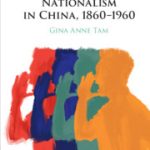
Gina A. Tam, Dialect and Nationalism in China, 1860-1960 (Cambridge: Cambridge University Press, 2020)
Gina A. Tam examines the complex relationship between language, identity, and nationalism in modern China, revealing how dialect politics shaped Chinese national consciousness. This innovative study demonstrates how local linguistic practices both supported and challenged state-building efforts, showing how ordinary people used language to negotiate their relationship with emerging national identities. Tam's work provides crucial insights into how cultural diversity and national unity coexisted and conflicted in modern China.

Alice L. Baumgartner, South to Freedom: Runaway Slaves to Mexico and the Road to the Civil War (New York: Basic Books, 2020)
Alice L. Baumgartner tells the remarkable story of enslaved people who escaped to Mexico, revealing a largely unknown geography of freedom that challenges traditional narratives of the Underground Railroad. This groundbreaking study examines how Mexico's abolition of slavery created a refuge for freedom seekers and how their experiences influenced American politics and diplomacy. Baumgartner demonstrates how these transnational movements of enslaved people shaped both Mexican and American understandings of freedom, citizenship, and national identity.
First Book (Women/Gender/Sexuality)
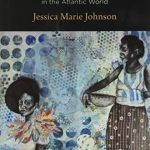
Jessica Marie Johnson, Wicked Flesh: Black Women, Intimacy, and Freedom in the Atlantic World (Philadelphia: University of Pennsylvania Press, 2020)
Jessica Marie Johnson explores the experiences of Black women across the Atlantic world, revealing how they navigated intimacy, sexuality, and freedom under conditions of enslavement and colonialism. This groundbreaking study examines how Black women used their bodies, relationships, and communities as sites of resistance and self-determination. Johnson demonstrates how these women created networks of care and survival that challenged colonial and slavery systems, showing their central role in shaping Atlantic world cultures and politics.
Runner-up

Erika Denise Edwards, Hiding in Plain Sight: Black Women, The Law, and the Making of a White Argentine Republic (Tuscaloosa: University of Alabama Press, 2020)
Erika Denise Edwards examines how Black women navigated legal systems and racial hierarchies in Argentina, revealing their crucial role in shaping the country's transition to a "white" republic. This innovative study shows how Afro-Argentine women used legal strategies to claim citizenship rights and economic opportunities while confronting efforts to erase their presence from national narratives. Edwards demonstrates how these women's legal activism both challenged and reinforced racial boundaries in modern Argentina.
First Book (Non-Women/Gender/Sexuality)

Sarah A. Seo, Policing the Open Road: How Cars Transformed American Freedom (Cambridge, MA: Harvard University Press, 2019)
Sarah A. Seo examines how automobiles transformed American concepts of freedom, privacy, and police power. This innovative study reveals how the rise of car culture created new forms of surveillance and social control, as traffic stops became a primary point of contact between citizens and law enforcement. Seo demonstrates how the automobile both expanded and constrained American freedom, showing how technological change reshaped the relationship between individuals and the state in unexpected ways.
Finalist
Amy C. Offner, Sorting Out the Mixed Economy: The Rise and Fall of the Welfare and Developmental State in the Americas (Princeton, NJ: Princeton University Press, 2019)
Amy C. Offner traces the rise and fall of developmentalist economic policies across the Americas, revealing how experts, policymakers, and citizens debated the proper role of government in economic development. This comparative study shows how ideas about state intervention circulated between the United States and Latin America, challenging traditional narratives about the origins of neoliberalism and the welfare state.
First Book (Women/Gender/Sexuality)

Lauren Jae Gutterman, Her Neighbor's Wife: A History of Lesbian Desire Within Marriage (Philadelphia: University of Pennsylvania Press, 2019)
Lauren Jae Gutterman explores the hidden history of married women who experienced romantic and sexual relationships with other women in mid-twentieth-century America. This groundbreaking study reveals how these women navigated the tensions between heterosexual marriage and same-sex desire, showing how they created spaces for intimacy and community within the constraints of heteronormative society. Gutterman demonstrates how these relationships challenged and reinforced conventional understandings of marriage, sexuality, and women's roles.
Finalist
Katie L. Jarvis, Politics in the Marketplace: Work, Gender, and Citizenship in Revolutionary France (New York: Oxford University Press, 2019)
Katie L. Jarvis examines how working women in revolutionary France used marketplace politics to claim citizenship rights and economic opportunities. This innovative study shows how women vendors, traders, and consumers participated in revolutionary political culture, challenging traditional boundaries between public and private spheres. Jarvis demonstrates how these women's economic activities became forms of political participation that shaped revolutionary ideologies and practices.
First Book (Non-Women/Gender/Sexuality)
Christine M. DeLucia, Memory Lands: King Philip's War and the Place of Violence in the Northeast (New Haven: Yale University Press, 2018)
Christine M. DeLucia offers a revolutionary rewriting of King Philip's War (1675-1676), centering Algonquian peoples' understanding of memory, loss, and historical narrative. This groundbreaking study moves beyond traditional military history to examine how Indigenous communities experienced, remembered, and transmitted knowledge about this devastating conflict. DeLucia demonstrates how places themselves hold memory, showing how landscapes, sacred sites, and geographic features served as repositories of Indigenous historical consciousness. The work challenges colonial and settler narratives by privileging Native perspectives and demonstrating how Indigenous peoples maintained their own historical traditions despite centuries of colonization. Memory Lands reveals the ongoing presence of Indigenous history in New England, showing how the violence of King Philip's War continues to shape contemporary landscapes and communities.
First Book (Women/Gender/Sexuality)
Keisha N. Blain, Set the World on Fire: Black Nationalist Women and the Global Struggle for Freedom (Philadelphia: University of Pennsylvania Press, 2018)
Keisha N. Blain explores the largely untold story of Black nationalist women's activism, demonstrating how they challenged white supremacy and advocated for full citizenship and human rights on a global scale. This groundbreaking study reveals how women like Amy Ashwood Garvey, Mittie Maude Lena Gordon, and Ethel Collins developed transnational networks that connected struggles for liberation across the African diaspora. Blain shows how these women articulated sophisticated political visions that combined anticolonialism, Pan-Africanism, and gender equality, often in tension with male-dominated organizations. The book demonstrates how Black nationalist women's activism shaped international conversations about decolonization, civil rights, and women's liberation, revealing their central role in twentieth-century freedom movements. Set the World on Fire challenges traditional narratives that marginalize women's contributions to Black nationalist politics, showing how they developed innovative strategies for resistance and community building.
First Book (Non-Women/Gender/Sexuality)
S. Debora Kang, The INS on the Line: Making Immigration Law on the US-Mexico Border, 1917-1954 (New York: Oxford University Press, 2017)
S. Debora Kang explores how officials from the United States Immigration and Naturalization Service formulated and implemented policies at the US-Mexico border, demonstrating the historical process of militarizing this border. This groundbreaking study reveals how immigration law was not simply created in Washington D.C. and then applied at the border, but rather how border enforcement shaped and created immigration policy itself. Using sources that include both local and national perspectives as well as oral histories, Kang shows how INS officials, local communities, and migrants themselves participated in the ongoing construction of immigration law and border enforcement practices. The work provides crucial insights into how immigration policy evolved on the southwestern border, revealing the complex negotiations between federal authority, local interests, and human mobility that continue to shape American immigration policy today.
First Book (Women/Gender/Sexuality)
Sasha Turner, Contested Bodies: Pregnancy, Childrearing, and Slavery in Jamaica (Philadelphia: University of Pennsylvania Press, 2017)
Sasha Turner focuses on enslaved women in late eighteenth- and early nineteenth-century Jamaica, examining how abolitionists viewed enslaved women's bodies as "reproductive laborers" while highlighting enslaved women's resistance to external control of reproduction. This field-changing book demonstrates how enslaved women navigated the competing demands of planters, abolitionists, and colonial authorities who all sought to control their reproductive capacities for different political and economic purposes. Turner reveals how these women developed strategies to maintain agency over their own bodies, pregnancies, and children despite the constraints of slavery. The work has profound implications for understanding the intersections of race, sexuality, and childbirth in the Atlantic world, showing how reproductive politics were central to the functioning and ultimate abolition of slavery in the British Caribbean.
First Book (Non-Women/Gender/Sexuality)
Anya Zilberstein, A Temperate Empire: Making Climate Change in Early America (New York: Oxford University Press, 2016)
Anya Zilberstein explores how colonial Americans understood and attempted to manipulate climate and weather patterns, revealing the deep historical roots of human-environment relationships that continue to shape contemporary climate politics. This innovative study examines how colonists believed they could "improve" American climates through deforestation, agriculture, and settlement, demonstrating how ideas about environmental change were central to colonial expansion and identity formation. Zilberstein shows how colonists drew on European theories about climate and temperance while developing distinctly American approaches to environmental management. The work reveals how early Americans' confidence in their ability to control nature laid the groundwork for later environmental attitudes and policies, providing crucial historical context for understanding modern climate change debates and human-environment interactions.
First Book (Women/Gender/Sexuality)
Marisa J. Fuentes, Dispossessed Lives: Enslaved Women, Violence, and the Archive (Philadelphia: University of Pennsylvania Press, 2016)
Marisa J. Fuentes offers a paradigm-shifting approach to studying enslaved women in eighteenth-century Barbados, highlighting her innovative archival research and analysis of the production and survival of knowledge about enslaved women. This groundbreaking study confronts the challenge of writing about people whose lives were systematically erased from the historical record, developing new methodological approaches for understanding how violence shaped both enslaved women's experiences and the archives that purport to document them. Fuentes demonstrates how colonial archives themselves participated in the violence of slavery by rendering enslaved women as objects rather than subjects, while simultaneously revealing how these women maintained agency and resistance despite brutal conditions. The work provides crucial insights into how historians can ethically and effectively recover the experiences of marginalized people whose stories have been distorted or silenced by oppressive systems.
Finalists
Zara Anishanslin, Portrait of a Woman in Silk: Hidden Histories of the British Atlantic World (New Haven: Yale University Press, 2016)
Zara Anishanslin uses a single portrait and silk dress to illuminate the complex networks of trade, labor, and cultural exchange that connected London, Philadelphia, and the wider Atlantic world in the eighteenth century. This innovative study demonstrates how material objects can serve as gateways to understanding larger historical processes, revealing the global connections embedded in seemingly local stories.
Emily K. Hobson, Lavender and Red: Liberation and Solidarity in the Gay and Lesbian Left (Oakland: University of California Press, 2016)
Emily K. Hobson explores the complex relationships between LGBTQ activists and the broader Left in the United States from the 1960s through the 1980s, revealing how gay and lesbian activists both challenged and worked within progressive political movements. This study demonstrates how sexuality politics intersected with other liberation struggles, showing the tensions and solidarities that shaped American radical politics.
First Book (Non-Women/Gender/Sexuality)
Vanessa Ogle, The Global Transformation of Time, 1870-1950 (Cambridge, MA: Harvard University Press, 2015)
Vanessa Ogle provides a transnational examination of how time was understood, managed, marked, and recorded across the world during the late nineteenth and early twentieth centuries. This groundbreaking study reveals how the standardization of time became a crucial element of modern state formation, economic development, and global connectivity. Ogle demonstrates how the establishment of standard time zones, the adoption of Greenwich Mean Time, and the synchronization of clocks around the world were not merely technical achievements but deeply political processes that reflected and reinforced imperial power, national sovereignty, and cultural identity. The work shows how different societies negotiated between local temporal traditions and global time standards, revealing the complex ways that modernity was experienced and contested around the world.
Finalists
Sanya Aiyar, Indians in Kenya: The Politics of Diaspora (Cambridge, MA: Harvard University Press, 2015)
Sanya Aiyar examines the complex political position of South Asian communities in colonial and postcolonial Kenya, revealing how Indians navigated between competing claims of belonging and loyalty in the context of decolonization and nation-building.
Ruramisai Charumbira, Imagining a Nation: History and Memory in Making Zimbabwe (Charlottesville: University of Virginia Press, 2015)
Ruramisai Charumbira explores how Zimbabweans used historical narratives and collective memory to imagine and construct national identity, showing how competing visions of the past shaped struggles over political legitimacy and cultural belonging.
Dana Simmons, Vital Minimum: Need, Science, and Politics in Modern France (Chicago: University of Chicago Press, 2015)
Dana Simmons examines how French scientists, policymakers, and social reformers attempted to define and measure human needs, revealing how scientific knowledge intersected with political debates about welfare, labor, and social responsibility in modern France.
First Book (Women/Gender/Sexuality)
Talitha L. LeFlouria, Chained in Silence: Black Women and Convict Labor in the New South (Chapel Hill: University of North Carolina Press, 2015)
Talitha L. LeFlouria provides a pathbreaking study that examines African American women's experiences in the penal system from Reconstruction through the 1930s, highlighting their labor, the violence they endured, and their strategies of resistance. This groundbreaking work reveals how Black women's imprisonment was central to the South's economic recovery after the Civil War, showing how convict leasing systems exploited their labor while subjecting them to sexual violence and brutal working conditions. LeFlouria demonstrates how these women developed networks of survival and resistance within and beyond prison walls, challenging narratives that render them as passive victims. The study provides crucial insights into how race, gender, and class intersected in the post-emancipation South, revealing the continuities between slavery and mass incarceration that continue to shape American criminal justice systems.
Finalists
Sara Fieldston, Raising the World: Child Welfare in the American Century (Cambridge, MA: Harvard University Press, 2015)
Sara Fieldston explores how American child welfare experts promoted their approaches internationally, revealing how domestic reform movements intersected with U.S. foreign policy and cultural imperialism during the twentieth century.
Olivia Weisser, Ill Composed: Sickness, Gender, and Belief in Early Modern England (New Haven: Yale University Press, 2015)
Olivia Weisser examines how early modern English people understood the relationship between physical illness and emotional distress, revealing how gender shaped medical theory and practice in ways that continue to influence contemporary healthcare.
First Book (Non-Women/Gender/Sexuality)
Tatiana Seijas, Asian Slaves in Colonial Mexico: from Chinos to Indians (Cambridge: Cambridge University Press, 2014)
Tatiana Seijas reveals the largely unknown history of Asian slavery in colonial Mexico, examining how thousands of people from China, Japan, the Philippines, and other parts of Asia were enslaved and transported to New Spain through the Manila-Acapulco galleon trade. This groundbreaking study demonstrates how these Asian slaves, known as "chinos," navigated complex legal and social systems to gain freedom and social mobility, often by claiming Indigenous identity. Seijas shows how Asian slaves played crucial roles in Mexico's colonial economy while developing strategies for survival and advancement that challenged Spanish colonial categories of race and status. The work reveals the global dimensions of slavery in the Americas, showing how the Pacific slave trade connected Mexico to broader networks of coerced labor and cultural exchange that extended across the Spanish empire.
First Book (Women/Gender/Sexuality)
Susanah Shaw Romney, New Netherland Connections: Intimate Networks and Atlantic Ties in Seventeenth-Century America (Chapel Hill: University of North Carolina Press, 2014)
Susanah Shaw Romney explores the intimate networks of family, friendship, and business that connected New Netherland to the broader Atlantic world, revealing how personal relationships shaped colonial politics and economic development. This innovative study examines how Dutch colonists maintained ties with family and associates in the Netherlands, the Caribbean, and other colonial settlements, showing how these connections influenced everything from trade relationships to marriage patterns to political alliances. Romney demonstrates how women played crucial roles in maintaining these networks through correspondence, kinship ties, and economic partnerships, challenging traditional narratives that emphasize formal political and commercial institutions. The work provides new insights into how intimate relationships and personal networks were fundamental to colonial society and Atlantic world connections.
First Book (Non-Women/Gender/Sexuality)
Teresa Barnett, Sacred Relics: Pieces of the Past in Nineteenth-Century America (Chicago: University of Chicago Press, 2013)
Teresa Barnett explores how Americans in the nineteenth century collected, preserved, and displayed historical artifacts, revealing how the veneration of material objects shaped national identity and historical consciousness. This innovative study examines how relics from the Revolutionary War, the Civil War, and other significant events became sacred objects that Americans used to connect with their past and define their national character. Barnett demonstrates how the collection and display of historical artifacts became a form of secular pilgrimage, showing how ordinary Americans participated in creating national memory through their engagement with material culture. The work reveals how the nineteenth-century cult of relics reflected broader anxieties about historical continuity, national identity, and the meaning of the American past in an era of rapid social and economic change.
First Book (Women/Gender/Sexuality)
Camille Robcis, The Law of Kinship: Anthropology, Psychoanalysis, and the Family in Twentieth-Century France (Ithaca, NY: Cornell University Press, 2013)
Camille Robcis examines how French intellectuals, policymakers, and legal experts used anthropological and psychoanalytic theories to define and regulate family relationships in twentieth-century France. This groundbreaking study reveals how ideas about kinship, incest, and family structure became central to debates about French national identity, social order, and moral authority. Robcis demonstrates how anthropologists like Claude Lévi-Strauss and psychoanalysts like Jacques Lacan influenced French law and policy, showing how scientific theories about human nature and social organization shaped everything from marriage law to adoption practices to debates about homosexuality. The work provides crucial insights into how modern states use expert knowledge to regulate intimate relationships and how scientific discourses about the family reflect broader anxieties about social change and cultural identity.
First Book (Non-Women/Gender/Sexuality)
Françoise N. Hamlin, Crossroads at Clarksdale: The Black Freedom Struggle in the Mississippi Delta after World War II (Chapel Hill: University of North Carolina Press, 2012)
Françoise N. Hamlin examines the civil rights movement in Clarksdale, Mississippi, revealing how African Americans in the Mississippi Delta developed sophisticated strategies for challenging white supremacy in one of the most oppressive regions of the Jim Crow South. This groundbreaking study demonstrates how local activists built on wartime experiences and economic opportunities to create sustained challenges to segregation and disenfranchisement. Hamlin shows how Clarksdale's unique position as a transportation hub and cultural center made it a crucial site for civil rights organizing, while also revealing the particular challenges that Delta activists faced due to the region's economic dependence on plantation agriculture. The work provides crucial insights into how the civil rights movement operated at the grassroots level, showing how local communities created the foundation for the more visible protests and legal victories of the 1960s.

